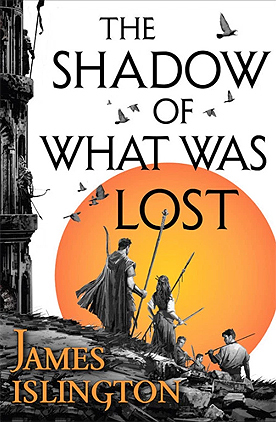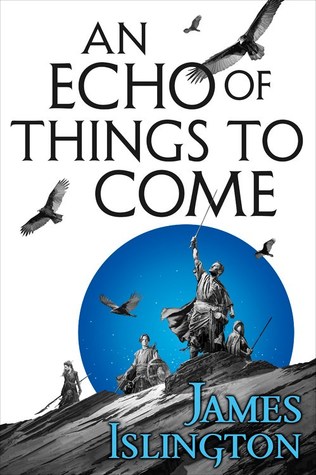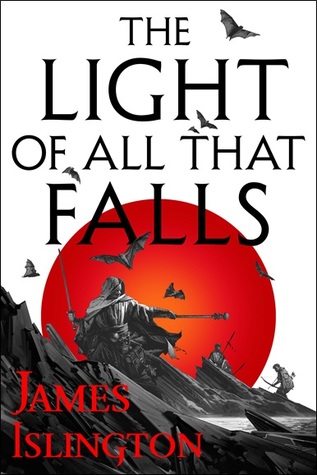"The Licanius Trilogy" review
Overview
Title: The Licanius Trilogy
Author: James Islington
Subgenre: High fantasy
2021 Bingo squares:
- Book 1 - Debut novel, Found family, Cat squasher, “{blank} of {blank}”
- Book 2 - Found family, Cat squasher, “{blank} of {blank}”
- Book 3 - Found family, Cat squasher, “{blank} of {blank}”
Recommend: Weakly yes, the plot is good enough that it makes up for the flaws. But there are flaws.
Stars: 3.5/5
Review
Let me preface this review by saying that overall I did enjoy this trilogy. I found the plot to be engaging (especially in the second book), and the political tensions along with several of the antagonists (Gassandrid in particular) were very well-crafted. However, for each of its broad strengths, The Licanius Trilogy had a number of specific weaknesses, so the majority of my review is going to be critical.
Because I’m reviewing the trilogy as a whole, I’m going to try and avoid going into specifics as much as possible; as I get more specific I’ll give a warning and divide with a cover image.

The good parts
As I said, the plot is super fantastic. You do need to get through a somewhat slow first-third-or-so of the first book before it starts to pick up, and then that “picking up” takes about another 10%, with the novel hitting its stride around the 40% mark or so. If you don’t enjoy it by about the halfway point, you have my permission to put it down and give up. But please do give it at least that long, because it’s really worth the wait.
Prophecy, time travel, changing loyalties, betrayal, the fallout from a decades-old war, the fallout from a millennia-old conflict, all that good stuff comes together with multiple viewpoint characters spanning multiple timelines and an entire continent over the course of the trilogy. While there’s a couple plotlines that drag (particularly one in the third novel, and as mentioned the opening of the first novel is a bit slow), for the most part the action is nonstop, and the conflict is continually evolving, with both short-term and long-term antagonists.
And the antagonists! They range from politicians to warring neighboring countries to terrifying shadowy monsters to gods. There are powerful mages with fun (or “fun”) personality quirks and means of fighting. Some of the most effective weapons are words, and some are literally weapons. Characters are forced to sacrifice what matters to them the most, whether it be their morals, their freedom, their lives, or their fate.
Prophecy constantly hints in the background, spelling disaster or safety. Altogether, it’s a compelling narrative that you never want to put down, and even though you’ve been told what’s happening next, you also have no idea what’s going to happen next.
There’s a lot to like about The Licanius Trilogy. Really there is.
The bad parts
There are three characters: Good, Bad, and Caeden
If you’re reading The Licanius Trilogy, it’s for the plot. It’s not for the characters. “Do the ends justify the means?” is a question that’s asked a lot, but it’s only really asked, as in, people literally ask it out loud in the text. It’s not exactly examined in character development; that is to say, other than Caeden, there are no characters who are difficult to characterize as either Good or Bad, unless we as readers are missing information that we need in order to judge them for plot tension reasons.
Caeden is the only exception: when we meet him, he has no memories and there are clear questions surrounding his morality. These questions will continue to grow throughout the series, and he’s pretty much the only character to undergo any kind of character development. And even so his development is heavy-handed at best; at worst, it’s not character development so much as a moral philosophy discussion projected onto a character.
The series suffers from “every adult is incompetent” syndrome
With only a couple notable exceptions, there’s a generational divide where “every adult is wrong” and “every teenager is right.” The Licanius Trilogy is certainly not YA fiction - there’s too much genocide, gruesome death, torture, etc for that - but it suffers from the same ailments that a lot of YA fiction does:
- Every adult in the room has a narrow-minded view of events, not having changed perspectives at all in the past twenty years. Yes, there are a few exceptions, but for the most part the main characters are teenagers who are stuck saving the world from incompetent adults. A tiring trope.
- The romance is truly uninspired.
The magical worldbuilding is actually really bad
Specifically, no rules at all are established early on about what Essence can and can’t do, allowing the author to pull any number of deus ex machinas out of a hat at any time he wants. We establish early on that Essence interacts physically with the world and that people can fight with it. New applications of Essence are then introduced sporadically throughout the entire trilogy. This slow introduction of powers could be justifiable if all of the POV characters were ignorant of what Essence was capable of for long periods of time, but this is not the case; several of them have been attending a magical school for years.
Part of the reason for this problematic world building is precisely the magical school: we spend no time here at all before leaving. Just enough to introduce a bunch of Capital Letter Nouns like Shadow, Gifted, Trials, Shackle, Essence, Treaty, Tenet, Finder, Administrator, Elder,…without explaining any of them, really. Normally we’d spend a couple chapters in the safety of the magical school to explain to the reader what exactly all these things mean, and establish some basic guidelines on what the magic system can and can’t do. Or, in lieu of that, our first adventure would feature witnessing an expert magic user show us these limits. Or we’d get a prologue with such a display. Or have the main character read a history book. Or, you know, anything.
Instead, we just…leave. And then go on an extremely tame quest in which no magic is able to be used and so we are literally incapable of getting any magical-system worldbuilding. You see the problem?
It’s a problem!
There are a lot of grammar issues
I…shouldn’t have to mention this in any review of anything published by a major publisher, ever.
with less than a hundred people living within the school walls
Gah! Fewer!
judging from the enormity of the trees
That is NOT what “enormity” means!
was the enormity of the rooms and hallways
It’s a common problem.
These are just a couple of the grammar mistakes I noticed; I didn’t record all of them, but there were a lot of disagreeing modifiers and incorrect pronouns and such. And I’m not a particularly careful reader by any stretch of the imagination, so I’m sure I caught at most a third or half of the mistakes that were present, if even.
The author also massively overuses semicolons. I like semicolons a lot. Really, a lot. I think I like them too much, and I try to avoid them in my own writing. But while reading The Licanius Trilogy, I was rephrasing sentences in my head to pretend they had , and because the semicolons were driving me so crazy. The semicolon use did get better as the trilogy went on, though, so that was encouraging.
I’m going to get a bit more spoiler-y after the next cover jump.

Issues with the plot
Despite its compelling intricacies, or maybe because of them, there are a couple issues with the plot.
It’s hard to care about the present
When you have a set of characters that are thousands of years old, and another set of characters who are like 15? 18? it’s hard to care about the teenagers. It’s hard to see anything the teenagers do as being remotely relevant to anything. This conundrum takes away a lot of the tension of events involving anyone not named Caeden.
There’s too many deus ex machina magical artifacts & abilities
Seriously. Wirr’s [redacted for spoilers], Davian’s kan…everything, it’s a bit too convenient. The author just says, “hey okay so not only do I never place limits on what Essence can do, but also, there’s arbitrarily powerful magical artifacts that can do whatever the hell I say so because…I say so!” And have fun with kan!
Like, I get it. We’re living in the remnants of a powerful ancient civilization, and we have lots of cool, fun toys. But you can’t just let these cool, fun toys do anything. Having Traps limit Essence use is good, but for the most part the limits on power use is…individual characters' morality. That’s okay, in some stories, but at the same time this story is attempting to tell epic battles, and that’s just at odds with telling a story about individual human morality decisionmaking, especially when part of that morality is “okay but I will in fact save my people when I need to.” Too much tension is erased.
And then that other deus ex machina
(You’ll know it when you get there)
After the final cover jump, I’m literally going to spoil the ending, so only read that if you’ve already finished the series or otherwise want the ending spoiled!

Spoilers!!
And then that other deus ex machina
“And that other deus ex machina” of course refers to Dezia and Aelric turning up with the Neskians. Uhhhhhh…….okayyyyyyyy.
Yeah, okay.
Yes, I did read the afterward about how there’s going to be another novel or trilogy or whatever about this, but that’s not an excuse. This trilogy is self-contained. This is a totally unexplained event that just happens and MASSIVELY affects the plot. These novels are 100% plot-driven. It just hammers home how none of the events in the present involving present-day characters matters in the slightest; it’s only Caeden/Tal’kamar’s story that matters.
The ending
I went into the trilogy knowing that “the ending was incredible!!!” As soon as we got to time travel, I was like, “hmmm ok Caeden and Davian are the same person.” Evidence: El was the god from Caeden’s childhood. Also “Aarkein Devaed” and “Davian” sound kinda similar. And Davian is clearly getting more ok with morally grey choices, Caeden doesn’t remember his past, so Davian is gonna turn into Caeden.
Then at the end of book 2 when we found out that Caeden kills Davian I was even more certain that Caeden is killing himself, shapeshifted to look like Davian. I also had this theory that Ashalia was going to rename to Elliavia in honor of El (like convert to a priestess or something). But THEN when we found out that Caeden grew up as an orphan and totally remembered his childhood, okay, fine, maybe they’re different people.
But I was still 100% certain Caeden was killing himself, especially because Davian was dead and you can only shapeshift into dead people. And then we find out that you can only shapeshift into people you kill yourself and…huh? So Caeden must have gone backwards in time to kill Davian then, and I had figured that he’d been one of the men who attacked Davian at the scene that Taeris took the blame for. The not-quite-abortion and Davian’s parents I totally did not even almost see coming, that part was really cool, but everything else was super incredibly obvious (at least with the hint of “the ending is incredible!!!!").
So anyway the fact that I was 100% convinced I knew what the ending was starting about 50% into book 1 (even if I was kinda wrong for the first large part…and yet still right in a way - Caeden WAS Davian, just not THAT Davian - I just didn’t know about it yet) definitely hurt my enjoyment. This is why I haven’t hyped up the ending elsewhere in the review, even though the ending is indeed incredible.
